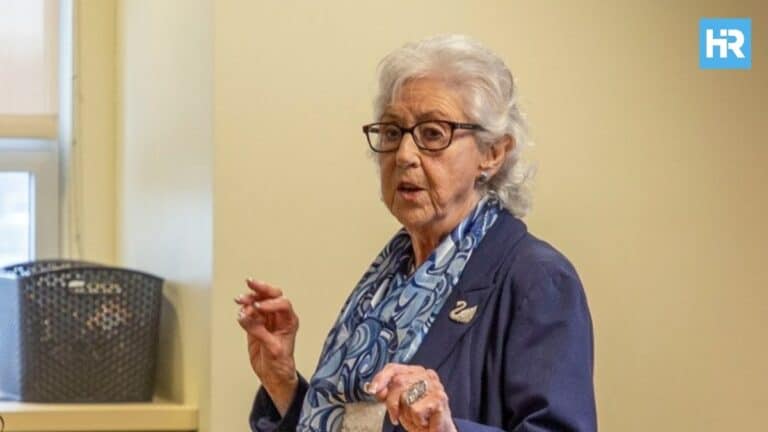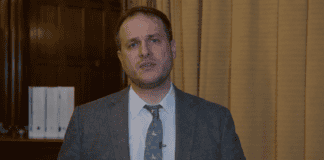
On April 5, 2024, students at Bayonne High School listened closely to Holocaust survivor Maud Dahme. She spoke clearly and directly about her life as a Jewish child during World War II. Now 88 years old and living in New Jersey, Dahme has spent the past four decades sharing her story to help students and teachers understand what happened and why it matters.
She was born Maud Peper in January 1936 in Amersfoort, a city in the Netherlands. Her father and grandfather owned a restaurant at the tram station. In May 1940, when Nazi Germany invaded the Netherlands, Maud was only four. Two years later, in 1942, the Nazis ordered all Jews in her town to report for transport. To save their daughters, her parents arranged for Maud and her younger sister, Rita, to be hidden by Christian families.
- Maud Dahme survived the Holocaust by hiding with Christian families in the Netherlands during World War II.
- She became a key figure in New Jersey’s Holocaust education efforts and has led educational trips to Holocaust sites since 1998.
- Bayonne High School and the City of Bayonne honor Holocaust survivors like Maud and Manya Frydman Perel through annual remembrance events.
Life in Hiding: Fear, Starvation, and Survival
Maud and Rita were just six and four years old when they went into hiding. Over the next three years, they lived with several families. They used false names and pretended to be Christian. During the harsh winters, food was scarce, to the point they had no option but to eat bugs and tulips. Maud once saw six Jews and the family hiding them executed by the Nazis.
In May 1945, the war ended in the Netherlands. The girls reunited with their parents, who had also survived in hiding with the help of the Dutch underground. However, the war had taken a heavy toll. Three grandparents, an aunt, an uncle, and cousins in their extended family were murdered at the Sobibor death camp. After the war, Maud became very ill and required months of rest to recover from the trauma.
In 1950, the family moved to the United States. They arrived through Hoboken, New Jersey, and settled in Palisades Park. Her father joined a food business. Maud finished high school and later worked at Pan American World Airways. There, she met Hans Dahme, who would become her husband. They married in 1957 and had four children, nine grandchildren, and two great-grandchildren.
Telling Her Story After Years of Silence
For 30 years after coming to America, Maud did not speak about her past. She learned English quickly and blended into American life. “When I came to this country in 1950, I never talked about who I am,” she said. That changed in 1981 when New Jersey formed a Holocaust education advisory council. She decided it was time to speak.
“I couldn’t be quiet anymore,” she said. “I realized how important it is to share my story and for people to realize this actually happened.”
Since then, Maud has worked to teach others about the Holocaust. She served 24 years on the New Jersey State Board of Education, including five years as president. She also became president of the National Association of School Boards, chaired the Interstate Migrant Education Council, and served for decades on the New Jersey Commission on Holocaust Education. In 2014, she was inducted into the New Jersey Hall of Fame as an Unsung Hero.
Holocaust Education in Europe
In 1998, Maud began leading annual trips for educators to Holocaust sites in Germany, Poland, the Czech Republic, and the Netherlands. One teacher on the trip said that visiting the Wannsee Villa outside Berlin, where Nazi leaders planned the “Final Solution,” changed how they taught the subject. “I stood there. I saw it,” they said. “It made the history real.”
Maud explained why these trips matter: “Teachers have seen the films and read the books. But to touch it, to smell it, is life-changing. After they return, they can really teach it.”
These experiences help teachers bring a deeper understanding to their students. Some even plan their own trips for students to local historical sites.
New Jersey now requires Holocaust education from kindergarten through 12th grade. This is thanks in part to Maud’s work and the state’s Holocaust Education Mandate, which began in 1994. “We’re celebrating 30 years this month,” Maud said. She believes that even young children can understand important values like kindness and respect.
Why Dialogue Between Generations Matters
Maud encourages parents and caregivers to join the conversation. During the pandemic, when schools used Zoom, she asked teachers to invite parents to listen. Her goal was to help both children and adults learn. “Nobody’s free until everybody’s free,” she said, quoting civil rights leader Fannie Lou Hamer.
Maud understands that talking about the Holocaust can be difficult. Her own mother feared that sharing the story might be dangerous. “You shouldn’t be doing that,” her mother once said. “It is going to happen again. Maybe not in your lifetime, but your children are all Jewish, and you are putting their life at risk.”
Despite the risk, Maud continues. “As long as I’m alive, I will keep telling my story,” she said. “We need to learn from what happened to stop it from happening again.”
Returning to Oldebroek
In the summer of 2023, Maud was invited back to Oldebroek, the Dutch village where she had once been hidden. She spoke at the church where she had gone as a child while in hiding. “Here I stood more than 80 years later to thank them,” she said. “It was very emotional.”
She also reflected on a family photo. “Our family tree, they cut off so many branches,” she said. “But our tree is growing again. Because people cared.”
Remembering the Victims and Survivors
On April 8, 2024, the City of Bayonne held its annual Holocaust Remembrance Day at City Hall. The event, held for over 30 years, included clergy from the UJA Federation of Bayonne and St. Mary’s Carpatho-Russian Church. Politicians like Assemblyman Nicholas Chiaravalotti, County Executive Tom DeGise, State Senator Sandra Cunningham, and Mayor Jimmy Davis were present.
“Today we remember those who perished, those who survived, and those who tried to help the victims,” said city spokesman Joe Ryan. “The best way to understand what happened during the Nazi era is to hear from those who lived through it.”
A short documentary by Bayonne High School graduate Patricia Iannaci featured another survivor, Manya Frydman Perel. Manya was 14 when the Nazis invaded Poland. She lost her family to the extermination camps and spent six years in concentration camps herself. She survived torture, starvation, and a death march before escaping into the forest and being rescued by soldiers.
“It was a silent war,” Manya said in the film. “Who had eyes, they did not see. Who had ears, did not hear. Who had mouths, did not speak out.”
She also shared a powerful message in her poem:
“If it only takes one individual to start so much destruction, then it only takes one to prevent it. We can be the ones. We must be the ones.”
The event ended with a candle-lighting ceremony. Six individuals—Katie Berces, Regina Resnick, Ruth Graff, Elyse Epstein Deutsch, Patricia Iannaci, and Sidra Tariq—lit candles on a Star of David in memory of the six million Jews who died in the Holocaust.









